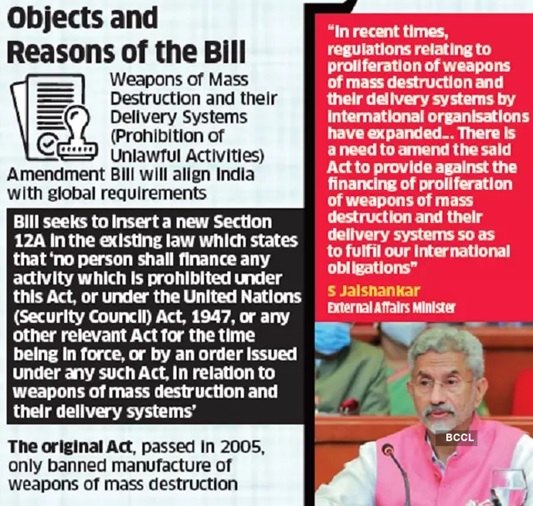

Context
External Affairs Minister S. Jaishankar introduced the Weapons of Mass Destruction and their Delivery Systems (Prohibition of Unlawful Activities) Amendment Bill, 2022, in Lok Sabha that seeks to prohibit the financing of weapons of mass destruction (WMD).
Background
What are Weapons of Mass Destruction?
|
Vocabulary history The expression “weapon of mass destruction” (WMD) is usually considered to have been used first by the leader of the Church of England, the Archbishop of Canterbury, in 1937 to refer to the aerial bombing of civilians in the Basque town of Guernica by German and Italian fascists in support of General Franco during the Spanish Civil War. |
- A weapon of mass destruction is a nuclear, radiological, chemical, biological, or other device that is intended to harm a large number of people.
-
- Examples include missiles or nuclear bombs, but as evident in the 9/11 terror attacks, even passenger jets can also be used as WMDs.
|
Key-highlights of the Bill
- The proposed bill focuses more on the financial bit of activities supporting WMDs and fits the missing block in fulfilling India's international obligations by adhering to the recommendations of the Financial Action Task Force (FATF) and United Nations Security Council's targeted financial sanctions against financing of WMDs.
- It seeks to ban funding of weapons of mass destruction (WMD) and empowers the Centre to freeze and seize financial assets of people involved in such activities.
- It also fulfils India’s international obligations pertaining to weapons of mass destruction.
- The Bill seeks to insert a new Section 12A in the existing law which states that “no person shall finance any activity which is prohibited under this Act, or under the United Nations (Security Council) Act, 1947 or any other relevant Act for the time being in force, or by an order issued under any such Act, in relation to weapons of mass destruction and their delivery systems”.
- It proposes to “prohibit any person from making funds, financial assets or economic resources or related services available for the benefit of persons related to any activity which is prohibited under this Act.”
What is the need of the Bill?
- The bill has been introduced now because “there is a need to amend the said act to provide against the financing of proliferation of weapons of mass destruction and their delivery systems so as to fulfil our international obligations,”.
- The bill’s statement of objectives and reasons says that in recent times, regulations relating to the proliferation of WMDs and their delivery systems by international organisations have expanded.
- The earlier law of 2005 regarding WMDs and their Delivery Systems (Prohibition of Unlawful Activities) only banned their manufacture.
- The existing Act (Weapons of Mass Destruction and their Delivery Systems (Prohibition of Unlawful Activities) Act, 2005) does not cover the financial aspect of WMD delivery systems and inclusion of new provisions was essential to meet India’s international obligations.

Control over use of WMDs
- The use of chemical, biological, and nuclear weapons is regulated by a number of international treaties and agreements.
- Among them are the
- Geneva Protocol, 1925, that banned the use of chemical and biological weapons
- Biological Weapons Convention, 1972, and Chemical Weapons Convention, 1992, which put comprehensive bans on the biological and chemical weapons respectively.
|
- The use and proliferation of nuclear weapons is regulated by treaties such as
- Nuclear Non-Proliferation Treaty (NPT)
- Comprehensive Test Ban Treaty (CTBT)

